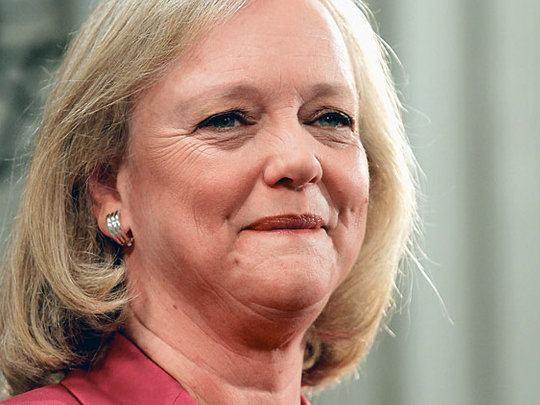
Sacramento: The name of Republican gubernatorial candidate Meg Whitman, a billionaire who has been defending her ties to beleaguered investment banking giant Goldman Sachs throughout her campaign, appears in the federal investigation of another Wall Street company tarnished by scandal.
Court documents filed by prosecutors in the aftermath of the dot-com bust show Whitman, then chief executive of eBay, listed among about 200 executives who were to receive gifts of deeply discounted stock from Frank Quattrone, then a banker at Credit Suisse First Boston.
A star dealmaker during the late 1990s, Quattrone was twice indicted on obstruction-of-justice charges stemming from a federal investigation of such gifts and other business practices.
Regulators charged that the gifts were used as incentives or kickbacks for corporate investment-banking business.
The regulators said the documents suggested that each of the executives listed could steer business to Quattrone's company. They show ratings, on a scale of one to four, of the business leaders' potential to produce such business.
Alongside Whitman's name and an account number is the numeral 2.
Authorities accused Credit Suisse of allocating shares of prime initial public offerings to clients on the list, which became known as ‘Friends of Frank', practically guaranteeing them a fortune when the price of the stock soared. The practice became a symbol of the way Wall Street companies rewarded friends and clients at the expense of smaller investors, whose only chance to buy the offerings was after the companies had gone public.
The documents do not show whether Whitman, who acknowledged receiving a special stock deal worth $1.78 million from Goldman Sachs, received stock from Credit Suisse.
She declined to discuss any dealings she may have had with Quattrone's group or to say whether his company ever deposited shares in an account for her.
The civil complaint against Credit Suisse alleged that Quattrone's group regularly sent executives on the list unofficial ‘Performance Reports' that were "meant to ensure that the discretionary account holders were aware of the extraordinary gains being generated for them".
The complaint did not identify the size of the stock gifts or name those who received them but said profits exceeded $1 million for some. The bank agreed to pay $200 million to settle the civil case — which included other conflict-of-interest charges — the day it was filed.












